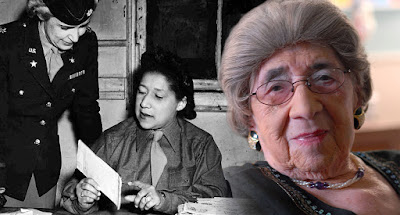With the
support of her friends — Michelle Terry (second from left), academic advisor,
WIU College of Business and Technology, Paula Rhodes (far right), a former WIU
employee, and Macomb resident Andrea Ratterman — Debbie Carter (far left)
completed the Western Illinois University Fallen Soldiers 5K this year. Carter
has had 11 surgeries on her knee over the past few years and has only been able
to put weight on it since April of this year.
Newswise, Macomb, December 26, 2016— Western Illinois
University's annual Fallen Soldiers 5K Run/Walk is one of the many ways the
University gives thanks to the men and women who have served our country. Every
year since the event was established in 2012, the proceeds raised by the
race—which drew close to 550 participants this year—are put toward Western's
Fallen Soldiers Scholarship, which honors WIU alumni Capt. Derek Dobogai and
Lt. Col. Robert Baldwin, both killed in the line of duty.
Dobogai, who graduated from Western in 2003 with a bachelor's degree in law enforcement and justice administration, was among the 14 U.S. soldiers aboard a Black Hawk helicopter that crashed Aug. 22, 2007, in northern Iraq.
Baldwin, who earned a bachelor's degree in industrial technology from WIU in 1993, was killed Sept. 21, 2010, when his Blackhawk UH-60 helicopter carrying international troops crashed during combat operations in the Zabul province of Afghanistan.
This year, Western's Fallen Soldiers 5K (held October 22),
too, provided a way for one local participant, Debbie Carter of Macomb, to show
her thanks to her friends and to her doctors, who all helped make it possible
for her to take part and even finish the 5K in under two hours.
"I have had 11 surgeries, and I was in a wheelchair for
three years because of my bad knee. I didn't even have a knee for a while. In
October 2015, I had my knee put back in for the third time, and even after
that, I still couldn't do any full weight bearing on it for a couple of months.
“Finally, in mid-December, when I went to the doctor at Mayo
Clinic, he gave me the okay to put some weight on it and walk. Unfortunately,
the next morning, I fell and fractured my ankle and my knee again. I was
non-weight bearing again until April of this year," Carter explained.
But with the support of her friends Michelle Terry, academic
advisor, WIU College of Business and Technology, Paula Rhodes, a former WIU
employee, and Macomb resident Andrea Ratterman, Carter planned to walk the 5K
this year. They started walking regularly in July to get Carter ready for the
course, which winds around and through WIU's hilly campus.
"My friends are the only ones who knew I was planning to
do this," Carter said. "I didn't even tell my husband, John, or my
son, Zachary."
Carter noted that she is proud of herself for completing the
race, and she is especially thankful to her friends, as well as a few
individuals, including Campus Recreation graduate assistants, members of
Western's softball team and students from The Crossing Fuel group (in Macomb),
who took the time to walk with her and her friends during the event.
Terry noted that not only did the members of the softball team
join them while they walked the course, but several individuals, also from the
WIU and Macomb community, cheered her on as she completed the course, which she
did in one hour and 57 minutes and 26 seconds.
When talking to Terry about Carter's accomplishment, she
couldn't help from getting emotional.
"It was amazing! Students seemed to come out of nowhere
and asked, 'Can we join you?' I just think it's an example of what being a
Leatherneck is all about," Terry said.
Vian Neally, assistant director of marketing at WIU Campus
Recreation and one of the individuals at Western who helps organize the Fallen
Soldiers 5K, described Carter as a "finisher" and said the support
she witnessed the community provided Debbie gave her "goosebumps."
"While Debbie was still walking the course, I was with
members of Western's All Volunteer Effort (WAVE) to take down the U.S. flags
that line the course.
“But, as we turned the corner by Waggoner Hall to start down
Western Avenue to take down the flags, we saw Debbie and all her supporters.
“One of the softball players escorting her ran up to us and asked if we could leave the flags up until Debbie passed by. Harv Draughan, from the Bushnell Patriot Flag Crew, and I asked all the volunteers to hold off taking down the flags until Debbie had passed.
“One of the softball players escorting her ran up to us and asked if we could leave the flags up until Debbie passed by. Harv Draughan, from the Bushnell Patriot Flag Crew, and I asked all the volunteers to hold off taking down the flags until Debbie had passed.
“We cheered her on until she turned the corner onto University
Drive, near the last part of the course. I radioed the Spencer Student
Recreation Center and asked them to find people to go cheer her on as she
crossed the finish line," Neally explained. "What a huge success
story!"
Because of her successful completion of the 2016 Fallen
Soldiers 5K, Carter said she and her family are planning to take part in the
event together next year.
The 2016 race raised more than $17,115, topping last year's
total. More than 530 individuals registered to participate. Since inception of
WIU's Fallen Soldiers 5K in 2012, more than $92,000 has been raised for the
Fallen Soldier Scholarship in honor of Dobogai and Baldwin.


